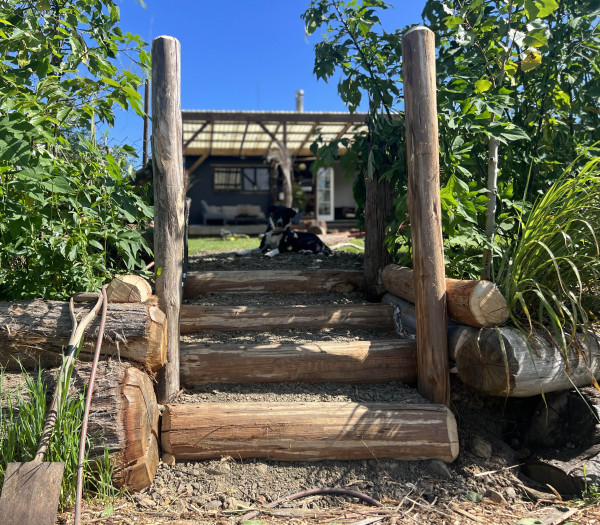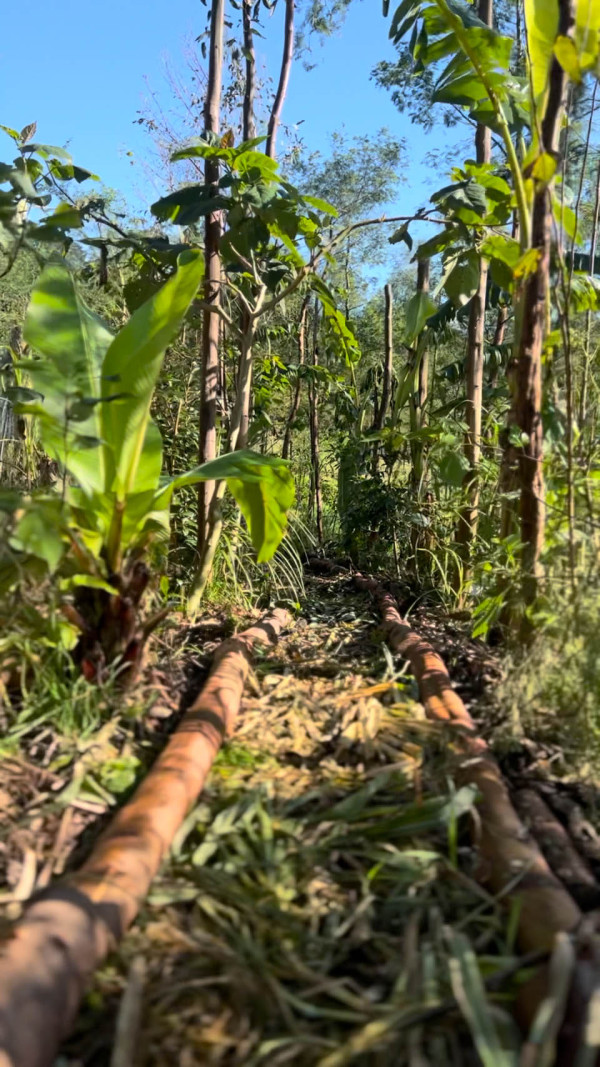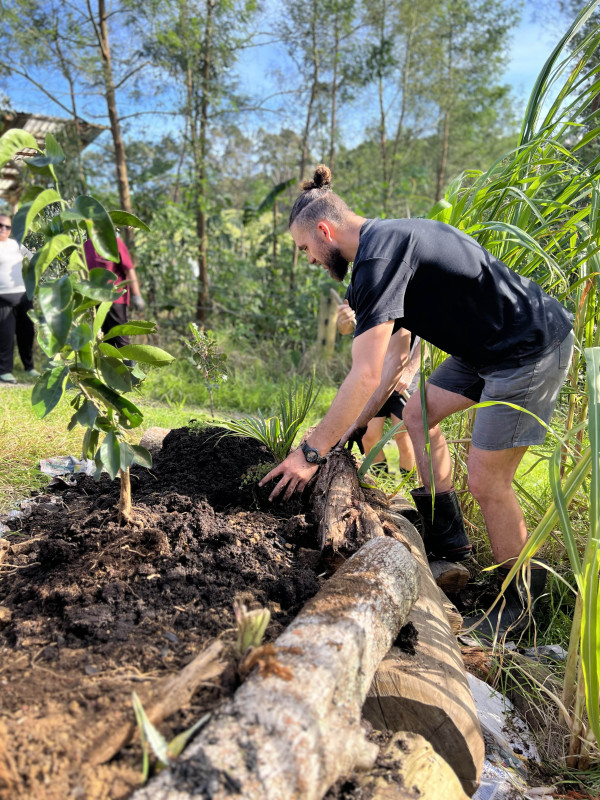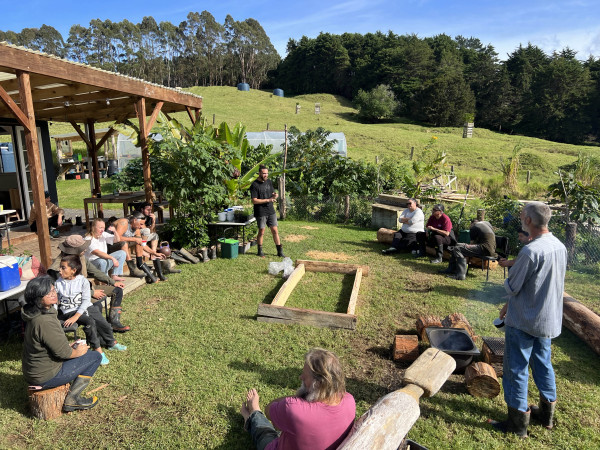This story is part of Re: News' Off The Grid Week, where we look at what it's like to go off the beaten path. Check out the rest of the stories here.
Before building his home, the biggest thing Jared Hiakita had made was a bookshelf.
Now, when he looks around his whare, nearly everything he sees, he and his family have either built, grown, or set up.
From solar panel systems, a compost toilet, and a greenhouse. To a food forest that will bring food security for generations to come.
“I'm trying to do things now that are going to be helpful for our descendants in 200 years' time,” Jared says.
Determined not to sign up for a 30-year mortgage, Jared Hiakita (Ngāi Tūhoe) and Rangimārie Mules (Ngāi Tahu, Ngāti Māmoe, Te Atiawa) pooled their money together to build a tiny home and a life off the grid in Hokianga.
But ditching the rat race isn’t the easy escape that’s often romanticised in Aotearoa.
They’ll be the first to say how much privilege it took to get to where they are. And building this life is their way of passing that privilege on.
Why we built our tiny house off the grid
Three years into their relationship, Rangimārie and Jared were living in Christchurch and starting to have 'those conversations'.
“What does our future look like? What are we going to do? Are we going to invest in something together?”
Both from rural backgrounds, Rangimārie says all they wanted was to avoid setting up a life of debt in the city.
“That’s when Jared got really into tiny homes. We could start something with relatively low risk and low investment and we didn’t have to lock ourselves into anything long-term, because we weren’t really sure what our future looked like or where we would end up," she says.

Outside Jared, Rangimārie and their son Taupae-Karaka’s home in Hokianga. Photo: Supplied.
They settled on building a tiny home on a towable trailer on gifted whānau land in Hokianga.
Down a long drive way, their home sits on a hill surrounded by native trees.
Using recycled materials and countless whānau working bees, Jared and Rangimārie estimate they’ve spent $50,000 building their home and about another $50,000 on developing the land around them to add things like water tanks, crops, a driveway, and solar panels.
Three years after finishing their home, they’ve gone from living a life of constant bills to the complete opposite.
“Now our costs are really just food, Starlink WiFi, and a small amount for charging our car in town to get home, but we charge it for free at home with our solar panels,” Rangimārie says.
“We put $300 in our weekly budget but we don’t spend that much.”
Building a food forest to feed our future mokopuna
Walking through Rangamārie and Jared’s food forest, you’ll find rows of avocado trees planted.
Not because avocados are practically a delicacy in New Zealand, but because avocado trees can live for hundreds of years.

Pathway through food forest. Photo: supplied.
“The trees we are planting now are going to be feeding people 100 years from now, maybe our great-grandchildren,” Jared says.
“We don't know what the future holds for us," he sighs. "But in recent years, food security has been vulnerable to road closures, massive weather events, and pandemics.
“The more we can do now to build resilient and regenerative food systems, the better off my grandkids and their grandkids are going to be.”

Jared planting on their land in Hokianga. Photo: supplied.
The food forest also has citrus trees, tamarillos, and bananas - which can take years to fruit, but they're “in it for the long game”, Rangimārie says.
They also have a more short-term garden where they grow some staple crops like kumara, potatoes, and corn that they harvest once a year. And they continuously grow and harvest things like lettuce throughout the year.
For Rangimārie, the ultimate goal is to be self-sufficient.
“But we need to be realistic about it. It takes time and a lot of learning. We even had to learn how to grow soil because we are on hard clay which is a gardener's nightmare.
“But we're starting to feel like we could grow 95% of our meals from home and will be living more like tangata whenua where we have to be more integrated with our ecosystem and what grows best here.”
Our lifestyle is how I uphold tino rangatiratanga
Tino rangatiratanga is often translated in English as the right for Māori to be sovereign, autonomous and have self-determination.
However, Jared says the “potent word” means so much more in te reo Māori, it’s impossible to accurately translate it.
For him, tino rangatiratanga looks like taking a seed he saved from his garden, sowing it in compost he made and then feeding his whānau from that garden.
“I have this closed loop where no one can interfere with it, or take that away from us,” he says.
“And the most beautiful thing is being able to pass that on to my son. I had to pay to learn everything we are doing now, but the way he's been brought up, it's just gonna be intuitive for him.
“His whole childhood is full of that. It's a beautiful feeling.”

Jared holding a wānaga with the local community about sustainable food systems. Photo: supplied.
Through ōNuku, a kaupapa Māori charitable trust, Jared now also hosts wānanga around the country to teach and build a community around food sovereignty and sustainable food developments.
He also shares his progress and learnings with others through his Facebook channel Red Haku.
We have to own the privilege it took to get here
Rangimārie and Jared say privilege is an important part of their story.
It’s woven into their journey - from building on gifted land that has been passed through seven generations of the whānau of Rangimārie, to having a community wrapped around them and Rangimārie earning an income high enough to financially support their family and mission.
“It's really important if you tell stories like this, that we demystify this type of lifestyle. When you’re renting and paying a shitload in the city, it's really easy to romanticise what it takes to live like this,” Rangimārie says.
“But if we didn’t have whānau land, then we wouldn't have the knowledge of how the land works. If we both needed to work full-time, then we would lose the time Jared has spent on our home.”
And while they are rural, they are not isolated, Rangimārie says.
From their porch you can see Rangimarie's parents house. Her two uncles live just over the hill.
"And my sister and her daughter live next door - so our son has a best mate who’s two years older.”
Jared says that intergenerational living and support when it comes to raising their son is something they can’t take for granted.
After returning home to Hokianga, Rangimārie says their relationship went from being about two individuals to being about a whole collective.
“My whole family was behind it, even if they don't really get it.”
“They are there enabling it and pushing it, helping us make some really big decisions that we didn't have much background in.”
Rangimārie says a lot of Māori have experienced displacement, urbanisation, broken families, or all of those things.
“But none of those factors play into my family's story,” she says.
“So there's all this intergenerational privilege, good privilege. And you can’t tell this story without acknowledging that.”
“The word privilege is looked down upon in a lot of ways. I wonder if the better word for privilege is legacy or intergenerational stability,” Rangimārie says. “That’s what we are trying to do here.”
This story is part of Re: News' Off The Grid Week, where we look at what it's like to go off the beaten path. Check out the rest of the stories here.
More Off The Grid stories:
Being a drop-out can be good: why you might not need to go to uni
Five U.S. states have gotten rid of the requirement for a uni degree for most jobs in government.
Germany returns Māori and Moriori remains to Aotearoa
Those involved say a significant amount of work has gone into returning these ancestors.
I tried to survive two days in the bush with no gear
Scientists say we are overdue for a major earthquake across the Alpine Fault.